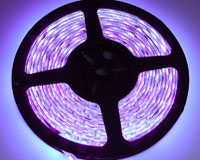In 2016, UV LED technology has been rapidly expanding into various application markets including curing, sterilization and purification equipment. The total value of the UV LED market worldwide is estimated to grow from US$166 million in 2016 to US$555 million in 2021 at compound annual growth rate (CAGR) of 27%, according to the 2016~2021 Global LED Industry Demand and Supply Database Report by LEDinside, a division of TrendForce.
Most UV LED products that are on the market or being developed fall under two major segments within the UV light spectrum: UV-A (320~400nm in wavelength) and UV-C (under 280nm in wavelength). Presently, the main source of UV-A LED demand comes from the curing market.

“The value of the entire UV-LED market has remained constant at US$122 million in 2014 and 2015 mainly because of the heated price competition among UV-A suppliers,” said Joanne Wu, assistant research manager of LEDinside. “However, curing equipment manufacturers in Europe, the U.S. and Japan are compelled to increasingly adopt UV LED solutions ahead of the worldwide ban on mercury vapor lamps in 2020. Hence, there will be a large wave of UV LED demand related to the replacement and modification of curing equipment. The curing market together with other applications will propel the global market value of UV LEDs to US$555 million in 2021.”
LEDinside furthermore estimates that the total market value of UV LEDs for the curing application will grow at a CAGR of 19% in the 2016~2021 period, from US$81 million to US$195 million. The market penetration of UV LED curing modules is also forecast to reach 50~60% by 2020.
As for UV-C LEDs, Wu pointed out that their applications include the preservation of fresh food and the purification of air and water. “The potential demand from these application markets are enormous,” said Wu. “As the technology continues to improve, the global market value of UV-C LEDs for the sterilization/purification application is forecast to grow at a high CAGR of 56% from US$28 million in 2016 to US$257 million in 2021.”
Wu noted there are high technological barriers to overcome when it comes to the manufacturing of UV-C LED products. “Difficult challenges exist in epi-wafer production, chip making and packaging” said Wu. “The market acceptance of UV-C LED products is also an issue. Though mainstream UV-C LEDs are generally high-end quartz packages, UV-C LEDs that use low-cost, silicone packages are also arriving on the market. Promoted by LED suppliers, silicone packages are mainly used for inexpensive consumer products as they have low current and short life time.”
The UV-C LED technology will improve rapidly as an increasingly number of major LED suppliers plan to launch products at the end of 2016. Presently, main UV-C LED suppliers are located in the U.S., Japan and South Korea. In the fourth quarter, the market can expect new UV-C solutions from Japan’s Nichia and several Taiwanese LED suppliers.





